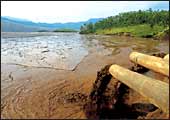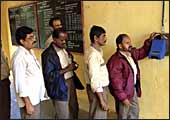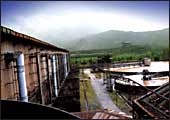|
Situated
6,215 feet above sea level, Kudremukh seems more like an idyllic
retreat than home to India's largest iron ore mine. The mining
town sits amidst rolling hills and lush green forest, with the
Bhadra river flowing softly 2 km in the north and the Kadambi
waterfalls making a thunderous racket towards the south-west.
For the 10,000 or so people who live in Kudremukh Iron Ore Company
township, it's been a paradise for nearly three decades.
But now, there's trouble in paradise.
On November 29 this year, a three-member
bench headed by Chief Justice Y.K. Sabharwal dismissed a review
petition and ordered that all mining activities be stopped by
January 1, thus bringing to an end a 10-year battle between KIOCL
and environmentalists, who claim that the company's open-cast
mines have ruined the local ecology. Says Leo Saldhana of the
Environmental Support Group, one of the agencies that campaigned
for the shut down: "(The decision) is a good sign. It only
re-emphasises the importance of protecting forests over mindless
development."
 |
| The problem: Waste from the mines ends
up in Lakhya dam |
Perhaps, but for the people of Kudremukh (it
means horse face in Kannada, and called so because of a peak shaped
like one), it's the end of the road. The Rs 1,854-crore public
sector company, which made a net profit of Rs 650 crore last financial
year, employs 2,000 people directly and another 2,200 on contract.
Besides, there are 10,000 people who depend on either the company
or its workers for survival. All of them must figure out a way
to survive once the excavators go quiet this new year's day. Says
Deputy General Manager K.C. Balasubramanyam, a KIOCL veteran of
27 years: "Jobs of thousands of people are under threat and
that means the local economy will be severely impacted."
 |
| Earth-moving monsters: They'll go silent
soon |
While environmentalists are convinced that
mining has ruined the ecology around the Bhadra reserve forest-Kudremukh
has been identified as one of the 18 biodiversity hotspots in
the world-company officials argue otherwise. KIOCL, they point
out, has planted 8.5 million trees in the mined areas, creating
an additional forest area of 2.75 sq km. That apart, it has raised
the height of the Lakhya dam to 100 metres to prevent overflow
of silt to the Bhadra river during monsoon. "Why, even last
year we were awarded the Golden Peacock Eco-Innovation Award by
the World Environment Foundation," points out a senior official.
"For 13 years, the so-called environmentalists kept quiet.
Somebody has to investigate their sources of funding," adds
another, hinting at corporate conspiracy.
 |
| Timed out: Employees will have to find
other jobs |
Some politicians like H.D. Deve Gowda, former
Prime Minister of India, have rallied around KIOCL. "I have
visited the place and I feel that the company has taken steps
to protect the environment." He says he has written to Prime
Minister Manmohan Singh to intervene. That's unlikely to help,
because this is a Supreme Court order. State Chief Minister Dharam
Singh is more diplomatic and says that his government is examining
if KIOCL can be supplied with iron ore from alternative sources.
Others like U.R. Anantha Murthy, Jnanpeeth Award winner and activist,
dismiss the suggestion as unfeasible: "For the sake of some
10,000 people, the interests of crores of others cannot be sacrificed.
Let them provide compensation to the employees."
Life After Kudremukh
For a company that almost died at conception-it
took a generous loan of $650 million from the Shah of Iran to
get it going in 1976-KIOCL has survived a number of odds. For
instance, soon after it was founded, the Shah was overthrown in
1979 and funds were cut off. KIOCL struggled to survive until
1983, when it found new export markets. Amazingly enough, KIOCL
may survive still-but not in Kudremukh. It has bagged a contract
for prospecting mines in Orissa for low-grade hematite ores. Once
the feasibility is established, KIOCL will examine investments.
 |
| Sunk cost: KIOCL has assets worth Rs
4,000 crore |
Then, it has requested for mining lease at
Ramanadurga in the Bellary-Hospet area in Karnataka, and has signed
a joint venture agreement with sail for mining at Bursua, Kalta,
and Taldih mines in Orissa. Meanwhile, the cash-rich company is
contemplating a VRS, besides transferring some personnel to KISCO
(Kudremukh Iron and Steel Company), its downstream JV with Metallurgical
and Engineering Solutions that produces pig iron and ductile iron
in Mangalore.
In the battle between environment and livelihoods,
there are never clear winners. While the people of Kudremukh township
may rue their loss of paradise, they may take solace in the fact
that they are saving it for generations to come to enjoy. Some
of them, surely, their own children.
|








